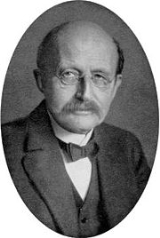
Max Planck
Max Karl Ernst Ludwig Planck (23 April 1858 – 4 October 1947) was one of the most important German physicists of the late 19th and early 20th century, winning the Nobel Prize in Physics in 1918; he is considered to be the inventor of quantum theory.
Sourced
- As a man who has devoted his whole life to the most clear headed science, to the study of matter, I can tell you as a result of my research about atoms this much: There is no matter as such. All matter originates and exists only by virtue of a force which brings the particle of an atom to vibration and holds this most minute solar system of the atom together. We must assume behind this force the existence of a conscious and intelligent mind. This mind is the matrix of all matter.
- “Das Wesen der Materie” (The Nature of Matter), speech at Florence, Italy, 1944 (from Archiv zur Geschichte der Max-Planck-Gesellschaft, Abt. Va, Rep. 11 Planck, Nr. 1797)
- We have no right to assume that any physical laws exist, or if they have existed up to now, that they will continue to exist in a similar manner in the future.
- The Universe in the Light of Modern Physics (1931)
- I regard consciousness as fundamental. I regard matter as derivative from consciousness. We cannot get behind consciousness. Everything that we talk about, everything that we regard as existing, postulates consciousness.
- The Observer (January 25th, 1931)
- Anybody who has been seriously engaged in scientific work of any kind realizes that over the entrance to the gates of the temple of science are written the words: Ye must have faith. It is a quality which the scientist cannot dispense with.
- Where Is Science Going? (1932)
- Both Religion and science require a belief in God. For believers, God is in the beginning, and for physicists He is at the end of all considerations… To the former He is the foundation, to the latter, the crown of the edifice of every generalized world view.
- Religion and Natural Science (Lecture Given 1937) Scientific Autobiography and Other Papers, trans. F. Gaynor (New York, 1949), pp. 184
- Eine neue wissenschaftliche Wahrheit pflegt sich nicht in der Weise durchzusetzen, daß ihre Gegner überzeugt werden und sich als belehrt erklären, sondern vielmehr dadurch, daß ihre Gegner allmählich aussterben und daß die heranwachsende Generation von vornherein mit der Wahrheit vertraut geworden ist.
- Translation: A new scientific truth does not triumph by convincing its opponents and making them see the light, but rather because its opponents eventually die, and a new generation grows up that is familiar with it.
- 'Wissenschaftliche Selbstbiographie. Mit einem Bildnis und der von Max von Laue gehaltenen Traueransprache. 35 pp. (Leipzig, 1948). Scientific Autobiography and Other Papers, trans. F. Gaynor (New York, 1949), pp.33-34 (as cited in T.S. Kuhn, The Structure of Scientific Revolutions).
- Condensed variant: Die Wahrheit triumphiert nie, ihre Gegner sterben nur aus. ~ Truth never triumphs -- its opponents just die out.
- Other condensed variant: Science advances one funeral at a time.
- Under these conditions it is no wonder, that the movement of atheists, which declares religion to be just a deliberate illusion, invented by power-seeking priests, and which has for the pious belief in a higher Power nothing but words of mockery, eagerly makes use of progressive scientific knowledge and in a presumed unity with it, expands in an ever faster pace its disintegrating action on all nations of the earth and on all social levels. I do not need to explain in any more detail that after its victory not only all the most precious treasures of our culture would vanish, but – which is even worse – also any prospects at a better future.
- Religion und Naturwissenschaft (Leipzig, 1958)
- New scientific ideas never spring from a communal body, however organized, but rather from the head of an individually inspired researcher who struggles with his problems in lonely thought and unites all his thought on one single point which is his whole world for the moment.
- Address on the 25th anniversary of the Kaiser-Wilhelm Gesellschaft, 10/11 January 1936. Quoted in Macrakis, Kristie Surviving the Swastika: Scientific Research in Nazi Germany (Oxford, 1993) ISBN 0-19-507010-0.
Unsourced
- It is not the possession of truth, but the success which attends the seeking after it, that enriches the seeker and brings happiness to him.
- No burden is so heavy for a man to bear as a succession of happy days.
- Science cannot solve the ultimate mystery of nature. And that is because, in the last analysis, we ourselves are a part of the mystery that we are trying to solve.
- We may conclude that from what science teaches us, there is in nature an order independent of man's existence, a meaningful order to which nature and man are subordinate.
